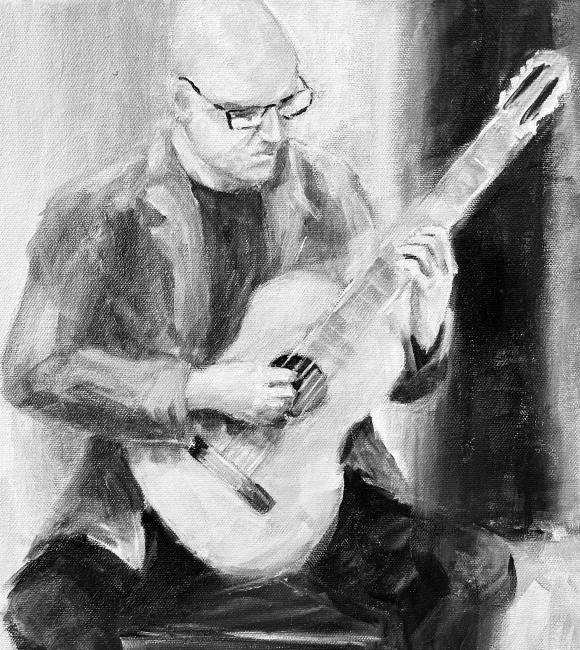
Dan Cosley is an improvising guitarist and composer based in Seattle, Washington.
Known for his combination of interpretive and improvisational abilities, Cosley was a protégé of the renowned classical guitarists Ricardo Iznaola and Roland Dyens.
Born in 1979 near Chicago, his early studies were with the Emmy Award-winning guitarist and composer Jamie Guscafré, who introduced Dan to the classical guitar, particularly the Cuban and South American repertoire.
Through Jamie, Dan met and was deeply influenced by Roscoe Mitchell, saxophonist, composer, and founding member of the Association for the Advancement of Creative Musicians (AACM) and the Art Ensemble of Chicago.
At the Rome Festival’s invitation, Dan made his European debut in 2000, performing the music of Heitor Villa-Lobos and Joaquín Turina.
He received a dual Master’s degree in Classical Guitar Performance & Composition from the Lamont School of Music at the University of Denver in 2005, where he was a graduate teaching assistant to Ricardo Iznaola and studied composition and orchestration with long-time Juilliard School composition department chair, Samuel Adler.
Dan became the first guitarist to win the Lamont Concerto Competition (performing the Villa-Lobos guitar concerto) and the first student to premiere an original concerto as part of his degree recital.
While in Denver, Dan premiered works by Stephen Goss and Gilbert Biberian under the guidance of guitarist Jonathan Leathwood. He was the second recipient (after Jonathan Leathwood) of the Ricardo Iznaola Scholarship and received the Graduate Recital of Distinction award.
After his graduate studies, Dan relocated to Tokyo, Japan, where he joined the Tokyo Guitar Ensemble. He appeared at numerous festivals and concert series in Japan, premiering works written for the ensemble by prominent guitar composers such as Roland Dyens, Benjamin Verdery, and Atanas Ourkouzounov.
Cosley was also a fixture on the Tokyo improvisational scene, collaborating with artists such as Samm Bennett, Norihiko Hibino, and Mike Rivett.
In 2010, Dan became the third non-Japanese composer (along with Andrew York and Roland Dyens) to receive the prestigious commission for the Japan Guitar Ensemble Association’s annual gala concert. The resulting composition, Waltz Triptych, is published by Les Production D’Oz.
He was then elected the association’s first non-Japanese director; duties included writing articles, arranging music, overseeing numerous publications and recordings for Gendai Guitar, adjudicating competitions throughout Japan, and appearing at festivals such as the Shonai International Guitar Festival.
After the 2011 earthquake in Japan, Cosley relocated to Portland, Oregon, where he initially worked for Oregon Catholic Press as a staff engraver/editor of masses, motets, and Gregorian chant.
From 2012 to 2016, Dan served as Professor of Music & Director of Guitar Studies at Marylhurst University. He also taught at Portland Community College and served on the board of directors for Classical Revolution PDX.
In Portland, Dan designed and taught many university courses, including applied classical & jazz guitar, music theory, orchestration, notation, music technology, music history, and composition, and directed numerous ensembles.
In 2013, the legendary luthier Robert Ruck requested Dan demonstrate two new instruments in a solo concert of the music of J. S. Bach and Francesco Canova da Milano.
Dan has long had an interest in Japanese traditional music, particularly the koto music of Tadao Sawai. 2016 Oregon Koto Kai commissioned Deep River, a trio for two 13-string kotos and 21-string bass koto. Deep River premièred at Portland State University during the ensembles’ 5th Anniversary Gala concert.
During his Portland period, Dan was mentored by multi-instrumentalist Ian Underwood (Frank Zappa, Quincy Jones, James Horner). He organized a free-improvisation concert and masterclass series featuring guitarist Marc Ribot. He also performed on sessions for producer Michael Hoppé, head of A&R for PolyGram Records (Vangelis, The Who, ABBA).
From 2017 to 2022, Dan lived in Kyoto, Japan, where his work centered on composition, improvisation, recording, and developing his online teaching platform, wayoftheguitar.com.
While in Kyoto, Dan co-founded the improvisation concert and workshop series Cosmic Fugue with trumpeter/cinematographer Christopher Fryman (Carl Sagan’s Cosmos). Cosley also scored films and television episodes for Japanese studios such as TOEI, collaborating with directors Minami Goto and Ryoma Masumoto.
In addition to his substantial output as a recording artist, Dan has authored over 30 publications – original compositions and arrangements with major publishers such as Les Productions d’OZ and Gendai Guitar, as well as self-published music theory and improvisation textbooks.
Cosley has published Beethoven, Ellington, and Monteverdi arrangements with Canadian publisher Les Productions d’OZ and Japanese publisher Gendai Guitar. His groundbreaking solo electric guitar arrangements of Charles Mingus’s music have garnered considerable acclaim.
In 2022, Dan studied constraint-based and algorithmic composition at Stanford University’s CCRMA (Center for Computer Research in Music and Acoustics). His interest in computer-assisted composition led to the publication of a fifteen-volume series of Renaissance-influenced two-voice modal counterpoint for flexible instrumentation: The Art of Canon: 254 Two-Part Inventions.
Cosley recently relocated to Seattle, Washington, where he continues his wide-ranging pursuit of performance, improvisation, and composition. He serves on the faculty of Edmonds College, where he teaches jazz & classical guitar, audio production, and jazz ensembles.
_____________
“Dan Cosley is a real, gifted musician with genuine skills as a composer. He belongs to a restricted community of guitarists who place music even above the guitar.”
– Roland Dyens
_____________
“Exceptional qualities as a performer, scholar, and human being… Cosley is also a very talented and accomplished composer and improviser.”
– Ricardo Iznaola
_____________